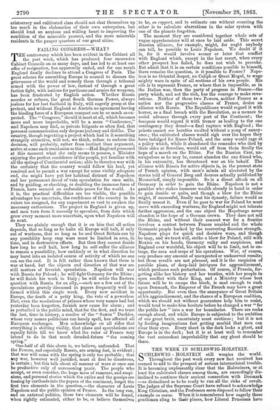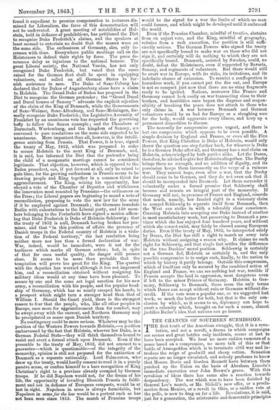THE WEEK IN SCHLESWIG-HOLSTEIN.
SCHLESWIG - HOLSTEIN still worries the world. Throughout the past week every new fact received has- seemed to add to the prospect of serious international trouble. It is becoming unpleasantly Clear that the Holsteiners, or at least the cultivated classes among them, are exceedingly dis- inclined to continue their ancient connection with Denmark —so disinclined as to be ready to ran all the risks of revolt. The judges of the Supreme Court have refused to acknowledge King Christian, and the Professors seem disposed to follow their example en masse. When it is remembered how eagerly these gentlemen cling to their places, how Liberal Prussians have found it expedient to promise compensation to lecturers dis- missed for Liberalism, the force of this demonstration will not be underrated. A great meeting of notabilities of Hol- stein, held in defiance of prohibitions, has petitioned the Diet to recognize Duke Frederick's claims, and the speakers at least seemed to entertain no doubt that the masses were on the same side. The enthusiasm of Germany, also, only in- creases with time. Everywhere public meetings call on the Holsteiners to defend their rights by force. The press de- nounces delay as injurious to the national honour. The great Liberal society, the National Verein, has not only recognized Duke Frederick, but voted that the sums raised for the German fleet shall be spent in equipping volunteers, and called on all German States to fur- nish assistance in men. The Duke of Saxe-Coburg has declared that the Dukes of Augustenburg alone have a claim to Holstein. The Grand Duke of Baden has proposed in the Diet to recognize the German pretender ; the "Grand Ducal and Ducal houses of Saxony" advocate the explicit rejection of the claim of the King of Denmark, while the Governments of Saxe-Weimar, Saxe-Altenburg, and Saxe-Meiningen, for- mally recognize Duke Frederick; the Legislative Assembly of Frankfort by an unanimous vote has requested the governing body to follow the Saxon example ; and the Chambers of Darmstadt, Wurtemburg, and the kingdom of Saxony, are convened to pass resolutions on the same side expected to be unanimous. More important than all, however, is the intelli- gence arriving from Prussia. That Power, it is true, signed the treaty of May, 1852, which was prepared in order to secure Holstein to the next King of Denmark, and, it is said, has informed the Diet that the pretender being the child of a morganatic marriage cannot be considered legitimate. That objection, however, which is opposed to the Baden precedent, can, if put forward at all, only be raised to gain time, for the growing enthusiasm in Prussia seems to be drawing people and King together in a common thirst for aggrandizement. The King, seizing his opportunity, has obeyed a vote of the Chamber of Deputies and withdrawn the innovation most resented by Prussians—the ordinances on the Press ; the Liberal papers are beginning to sound a note of reconciliation, proposing to vote the new law for the army if it be employed against Denmark ; the Germans inundate Berlin with exhortations to the Liberal party, and 150 mem- bers belonging to the Fortschritt have signed a motion affirm- ing that Duke Frederick is Duke of Holstein-Schleswig; that the treaty of 1852 is mill, Denmark having broken her pro- mises, and that "in this position of affairs the presence of Danish troops in the Federal country of Holstein is a viola- tion of the Federal territory," the last resolution being neither more nor less than a formal declaration of war. War, indeed, would be immediate, were it not for the tardiness which marks all German action; but, in spite of that for once useful quality, the danger still presses close. It seems to be more than probable that the temptation will prove too great for the King. The quarrel with the deputies has worried although it has not impressed him, and a reconciliation obtained without resigning his military ideas would at any time have been pleasant. To secure by one and the same act legal sanction for his new army, a reconciliation with his people, and the popular head- ship of Germany, which has so nearly escaped his hands, is a prospect which might turn a stronger head than that of William I. .Should the Court yield, there is the strongest reason to fear that the people, who, like all other peoples in Europe, care more for aggrandizement than for comfort, may be swept away with the current, and Northern Germany may be precipitated en mane upon Danish territory.
No contingency could be more serious. Whatever may be the position of the Western Powers towards Holstein,—a position embarrassed by the fact that Holstein, whoever her Duke, is a German Federal State—they will think themselves bound to resist and avert a formal attack upon Denmark. Even if the preamble to the treaty of May, 1852, did not amount to a guarantee—which is questionable—of the integrity of the monarchy, opinion is still not prepared for the extinction of Denmark as a separate nationality. Lord Palmerston, whhir drew up the treaty, would hardly consent to read it in a purely passive sense, or confine himself to a bare recognition of King Christian's right to a province already occupied by German troops. If he did Napoleon would not, for the dream of his life, the opportunity of invading Rhenish Prussia in fulfil- ment and not in defiance of European compacts, would be at last in sight. Napoleon in arms is always formidable, but Napoleon in arms for the law would be a portent such as has not been seen since 1815. The march of Prussian troops would be the signal for a war the limits of which no man could foresee, and which might be developed until it embraced the world.
Even if the Prussian Chamber, mindful of treaties, abstains from an unjust vote, and the King, mindful of geography, refrains from a rash execution, the position is still suffi- ciently serious. The German Powers who signed the treaty are not specifically bound to make war on those who did not sign it, and certainly will do nothing to which they are not specifically bound. Denmark, assisted by Sweden, could, no doubt, defeat the Holsteiners, even if supported by Bavaria, Saxony, and regiments of volunteers. But there would still be overt war in Europe, with its risks, its irritation; and its indefinite chance of extension. To restrict a conflagration is hazardous work, if you cannot put the fire out, and Europe is not so compact just now that there are no stray fragments ready to be ignited. Nations, moreover like France and Germany cannot look coolly on war transacting close to their borders, and hostilities once begun the disgrace and respon- sibility of breaking the peace does not attach to those who only chime in. A war between Denmark and German volunteers would be as bad for Europe as a sloughing sore for the body, would aggravate every illness, and keep up a permanent disposition to disease.
The necessity for compromise grows urgent, and there is but one compromise which appears to be even possible. A simple decision by England and France, or even all the Five Powers, that King Christian is Duke of Holstein, would only throw the question one step farther back, for whoever is Duke he is a German Duke after all, and Germany has a real claim on Holstein, acknowledged by both parties alike. Let the Danes, therefore, be advised to give her Holstein altogether. The Duchy brings them no strength, and no addition of dignity, and its possession keeps them incessantly on the verge of a ruinous war. They cannot hope, even after a war, that the Duchy should cease to be German, and they do not even ask that it should be incorporated into Denmark. Let them surrender it voluntarily under a formal promise that Schleswig shall become and remain an integral part of the monarchy. If Germany will not, in presence of France and England, concede that much, namely, her fancied right to a visionary claim to compel Schleswig to separate itself from Denmark, then the West can strike in with a tolerably clear conscience. Coercing Holstein into accepting one Duke instead of another is most unsatisfactory work, but preserving to Denmark a pro- vince which she has enjoyed four hundred years, and without which she cannot exist, may fairly be classed among European duties. Even if the treaty of May, 1852, be interpreted solely by Danes, the Diet has still a right to march an army into Holstein without assigning a reason why. It claims no such right for Schleswig, and that single fact settles the difference in the two Duchies' moral position. Schleswig is certainly not a German fief, Holstein as certainly is, and the only possible compromise is to assign each, finally, to the nation to which by history it partly belongs. Outside this compromise, which of itself can only be secured by the combined action of England and France, we can see nothing but war, terrible if Prussia accepts the lead in aggression, most dangerous even if left to the minor Princes of Germany. Holstein to Ger- many, Schleswig to Denmark, those seem the only terms which Danes can accept without ruin or Germans without dis- credit. If the vote were a popular one, as we suggested last week, so much the better for both, but that is the only con- clusion by which, as it seems to us, diplomacy can hope to avert a calamity which, brought on for such a cause, almost justifies Butler's idea that nations can go insane.































 Previous page
Previous page